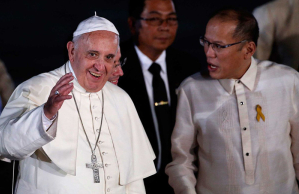
Pope Francis may be busy visiting millions of people in the predominantly Catholic Asian country of the Philippines this week, but he had time to comment on the concept of freedom of speech in light of the attacks in Paris.
According to Krishnadev Calamur of NPR, the pope defended freedom of speech as a fundamental human right. However, Francis said that there were limits to this freedom, noting that it must not cause offense, especially when the topic focuses on someone's religion.
"It is true we cannot react violently," Francis said to reporters while in transit to the Philippines. "But if Dr. [Alberto] Gasbarri here, a great friend, were to say something insulting against my mother, a punch awaits him."
In his example, the pope was referring to Alberto Gasbarri, an official who organizes papal trips according to NPR. He stood next to the pope when the comments were made to reporters.
"You cannot make provocations," Francis said. "You cannot insult people's faith."
Deborah Ball of the Wall Street Journal reported that Francis spoke in reference to last week's assault on French publication Charlie Hebdo, which has a history of publishing content that has offended all religions on its front page, including Islam, Judaism and Christianity. The publication has even derided the Vatican and Roman Catholicism at times.
"No one can kill in the name of God," Francis said. "This is an aberration."
NPR described that limit as explained by Francis.
"Killing in the name of God is an aberration against God," he said. "I think this is the main thing with freedom of religion. You can practice with freedom but without imposing or killing."
The pontiff elaborated on his point to reporters.
"There are a lot of people who speak badly about other religions," the pontiff said. "They make fun of them. What happens is what happens with my friend [who insults my mother]. There is a limit."
However, the Wall Street Journal reported that the 78-year-old pontiff strongly denounced the attack by two militant Muslim gunmen on Charlie Hebdo.
"He has frequently denounced killings and persecution, particularly of Christians, perpetrated by Islamic fighters in the name of religion," Ball wrote. "The pontiff has been a strong advocate of interreligious dialogue, even in the face of Islam-inspired violence."
Ball added that the pope's in-flight remarks could fuel debate about the limits of freedom of expression around the world. In addition, Muslim leaders around the world generally consider any depiction of the Prophet Muhammad as offensive regardless of context, according to NPR.
"Each person not only has the freedom but also the obligation to say what he thinks in the name of the common good," Francis said. "Each religion has its dignity. I cannot make fun of it."
As for his visit to the Philippines, Nicole Winfield and Oliver Teves of the Associated Press reported that the pope urged Filipinos to reject the corruption that was endemic within the Asian country, noting the "scandalous" poverty.
"Corruption has wracked the Philippines since the 20-year rule of late dictator Ferdinand Marcos, who along with his shoe-loving wife and cronies were suspected of stealing between $5 billion and $10 billion before being ousted from power in 1986," Winfield and Teves wrote.
According to the Associated Press, Philippine President Benigno Aquino III won the 2010 election by a wide margin on promises to tackle the endemic problems of corruption and poverty. The government there has investigated and detained some high-level politicians, accusing them of practicing corruption.
In his speech to Aquino and other officials, the pope requested that political leaders be "outstanding for honesty, integrity and commitment to the common good." According to the Associated Press, he challenged all Filipinos regardless of social status "to reject every form of corruption which diverts resources from the poor, and to make concerted efforts to ensure the inclusion of every man and woman and child in the life of the community."
During his visit, the pope is scheduled to meet with Filipino families, including survivors affected by the 2013 Typhoon Haiyan, which left more than 7,300 dead and missing and leveled entire villages across the Philippines according to the Associated Press.







